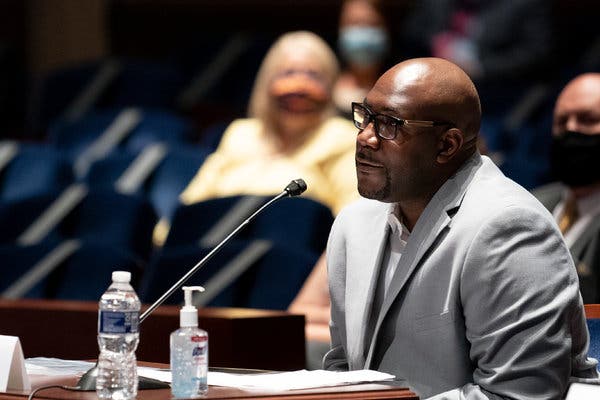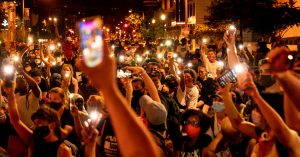1. “I’m here to ask you to make it stop.”
Philonise Floyd, a brother of George Floyd, testified before the House Judiciary Committee during a hearing on police brutality. He offered a wrenching plea for change to law enforcement, describing the agony of watching the video of his older brother dying while pinned under the knee of a white police officer.
Mr. Floyd was among more than a half-dozen civil rights experts and activists called to a hearing to consider the most expansive federal intervention into policing in recent memory.
House Democrats have indicated that they hope to act on the measure by month’s end. Congressional Republicans, faced with a rapid shift in public opinion, are scrambling to respond.
Separately, President Trump shut down the idea of removing Confederate names from Army bases, after top Pentagon officials expressed openness to it.
The Times is providing free access to much of our coronavirus coverage, and our Coronavirus Briefing newsletter — like all of our newsletters — is free. Please consider supporting our journalism with a subscription.
2. Virus cases surpassed two million in the U.S. and daily reports are increasing in 21 states, amid efforts to reopen.
New hot spots have emerged, including in Arizona, where an increase in cases and hospitalizations has alarmed local officials. The state was one of the earliest to ease restrictions. This map shows where the numbers of new cases are rising and where they are falling in the last 14 days.
The Fontainebleau Miami Beach hotel, above, reopened even as Florida saw persistent growth in coronavirus cases.
Reopening is shaky in countries around the world. India is now producing more new daily coronavirus infections, around 10,000, than all but two other countries, the U.S. and Brazil. Mexico, Russia, Iran and Pakistan have all also decided they must end lockdowns because the economic damage was too devastating.
3. The Federal Reserve offered a grim outlook for the economy in 2020.
The central bank predicted the unemployment rate to end this year at 9.3 percent and remain elevated for years, easing to 5.5 percent in 2022. The new forecasts predict a much slower path back to economic strength than the Trump administration — and perhaps the stock market — seems to expect.
The Treasury Department said the U.S. budget deficit grew to a record $1.88 trillion for the first eight months of this fiscal year because of pandemic relief spending. Treasury Secretary Steven Mnuchin told lawmakers that an additional round of economic stimulus would be needed.
4. Our reporters looked at how the devastation brought by the coronavirus pandemic in 25 cities and regions compares with other deadly events, like hurricanes, tsunamis and the Sept. 11 terror attacks.
Cities where deaths have soared to five times the normal levels or more, like New York City and Bergamo, Italy, are in territory that few places have ever seen outside of famine or war. One takeaway: The 1918 flu raised New York City’s deaths to 3.97 times the normal amount. The city’s deaths this April grew to almost six times the usual number.
Researchers around the world are developing more than 135 vaccines against the coronavirus. Our Science team is tracking their development and status.
5. The Justice Department engaged in a “gross abuse of prosecutorial power” by moving to drop the case against Michael Flynn, a retired judge said in a court brief.
John Gleeson urged a court to reject the Trump administration’s unusual effort to dismiss criminal charges against Mr. Flynn, pictured in 2018, saying that Attorney General William Barr gave special treatment to the former Trump national security adviser, who twice pleaded guilty to lying to the F.B.I.
The Justice Department “has treated the case like no other, and in doing so has undermined the public’s confidence in the rule of law,” Mr. Gleeson wrote. The Justice Department plans to file its response to Mr. Gleeson’s brief in the coming days.
6. Georgia’s wasn’t the only troubled primary.
Experiences in 16 primaries, capped by Georgia’s disastrous performance on Tuesday, offer warnings and a few reassurances for the November elections. The most definitive lesson: There’s an enormous chance many states, including key battlegrounds, will not finish counting on election night. Above, voters in North Las Vegas, Nev., on Tuesday.
President Trump will return to the campaign trail on June 19, with a rally in Tulsa, Okla., for the first time since the coronavirus outbreak.
Meanwhile, many Democrats have been increasingly vocal in urging that Joe Biden give deeper consideration to placing a black woman on the ticket.
7. The fallout over America’s vast reckoning with racism has been swift, fierce and almost everywhere.
Some of the pileup of evidence: NASCAR said it would ban the Confederate flag from its events and properties. Above, Talladega Superspeedway in Talladega, Ala.
“Cops,” a long-running reality show that has been accused of glorifying the police, was canceled. (The effect of decades of fear-mongering crime shows will linger, our TV critic writes.) “Paw Patrol” could be next.
HBO Max removed “Gone With the Wind” from its catalog, citing the film’s romanticization of the Civil War-era South while glossing over its racial sins.
And Merriam-Webster is revising its entry on racism to better reflect its systemic presence in society.
8. Juneteenth is going to feel different this year.
With the dual pressures of unrest and the pandemic, black chefs are contemplating ways the African-American independence day can help Americans cope. The day is named for June 19, 1865, when enslaved Africans in Galveston, Texas, learned from Union soldiers that they were free, more than two years after the Emancipation Proclamation.
“I’ve never been a political or social activist. It’s not my career,” said Edouardo Jordan, above, who owns three restaurants in Seattle. “But I have a platform. I have to use my platform to stay alive and to survive.”
Nicole Taylor, the author of “The Up South Cookbook,” selected 20 recipes for Juneteenth, including Mr. Jordan’s red punch.
9. The hottest new art gallery in New York can be found at La Guardia Airport.
The new Terminal B is home to four airlines and interlaced with four sprawling art installations, three of which are accessible without a boarding pass. The artists are Sara Sze, Laura Owens, above, Sabrine Hornig and Jeppe Hein.
The building, which opens Saturday, is part of an $8 billion transformation of an airport long maligned by New Yorkers and travelers alike. Both President Trump and Joe Biden have derided the airport as “third-world.”
10. And finally, the “invisible garden” of scent.
If you choose plants just for the way they look, you’re missing out. Our garden columnist draws on the work of Ken Druse, a natural gardening expert, to say it’s time to take a fragrance inventory. You can punch up the scent quotient in strategic spots like well-traveled paths or outdoor seating. Above, the New Dawn variety of roses.
Scent is a design layer that is often overlooked, but factoring in fragrance delivers another sensory dimension. Everyone’s olfactory system works differently, so the scents you favor are highly personal. Scent interpretation, after all, lies in what Mr. Druse calls the “the nose of the beholder.”
Have a sweet night.
Your Evening Briefing is posted at 6 p.m. Eastern.
Want to catch up on past briefings? You can browse them here.
What did you like? What do you want to see here? Let us know at [email protected].


















